Contact Us
- Phone: 651.487.7752
- Email:
- Mailing Address: 1215 Roselawn Ave. West | Roseville, MN 55113

Click here if you prefer to download and print the Pipe Organ Intent to Give Form, complete it and mail it in.
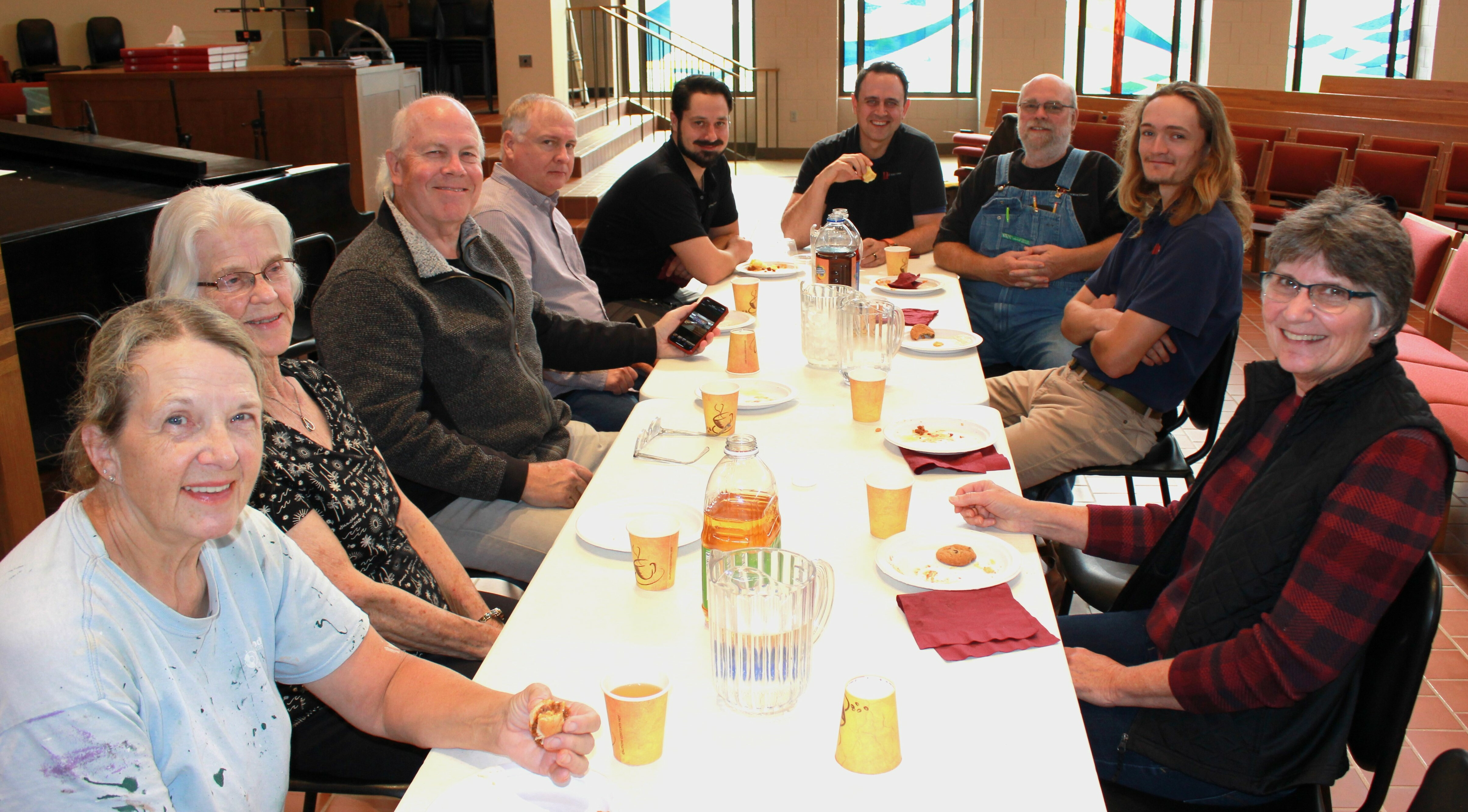 The crew from J.F. Nordlie was on-site last Friday to perform a physical survey of RLC’s organ pipe loft and collect the pipe diameters of those that will be re-used in our new organ. This will allow Nordlie to create accurate renderings of the new instrument. Several components have been ordered such as the leathers (22 skins of various thicknesses and finishes) and all the fuses for the control system. There will be nearly 100 fuses in our organ! Construction has begun on small generic components. The Organ Project Team provided lunch for the crew and it was exciting to hear the wheels are turning! RLC member Mike Dolan leads the team of volunteers responsible for putting up the Christmas mural and stopped by to discuss the mural logistics with the Nordlie team.
The crew from J.F. Nordlie was on-site last Friday to perform a physical survey of RLC’s organ pipe loft and collect the pipe diameters of those that will be re-used in our new organ. This will allow Nordlie to create accurate renderings of the new instrument. Several components have been ordered such as the leathers (22 skins of various thicknesses and finishes) and all the fuses for the control system. There will be nearly 100 fuses in our organ! Construction has begun on small generic components. The Organ Project Team provided lunch for the crew and it was exciting to hear the wheels are turning! RLC member Mike Dolan leads the team of volunteers responsible for putting up the Christmas mural and stopped by to discuss the mural logistics with the Nordlie team.
As of October 10, 2023, the committed donations for the pipe organ project are $639,708 or 75% of the project goal and many supporters have begun fulfilling their 2023 Intent to Give commitments. We want to finish strong by raising the remaining $210,292 in commitments by the end of this year! Commitments will be paid over three years (2023-June 1, 2025). You can support the project by filling out an Intent to Give form at www.rosevillelutheran.org/organ, or print the form and mail it.
For supporters who have designated an Intent to Give for 2023 and those wishing to make a financial contribution this year, please send your donation to the attention of Laurel Hofeldt, RLC Director of Finance, and designate Organ Fund in the memo line. If you have forgotten the amount of your Intent to Give, please email Laurel at and the Finance Office can assist you. Your support of this legacy project is greatly appreciated!
The RLC Organ Task Force has accomplished the task of identifying a long-term solution for our organ and has transitioned to become the RLC Organ Project Team to manage the project of bringing the refurbished Holtkamp organ to RLC. Under RLC’s new organizational model, the Organ Project Team will operate under the RLC Resources area with Pastor Lauren as the designated staff representative and Erik Storlie as the executive representative. The team looks forward to the next steps in this exciting project.
As of August 24, 2023, the committed donations for the pipe organ project are $601,485 or 71% of the project goal. To support the project, you may fill out the Intent to Give form online or print the form and mail it. You may also give directly online today without making an Intent to Give. Thank you for your generous support over and above your regular giving to the church.
Please use the following links:
For supporters wishing to fulfill their Intent to Give commitment in 2023 and those wishing to make a financial contribution this year, you may send your donation to the attention of Laurel Hofeldt, Director of Finance, and designate Organ Fund in the memo line.
Below this line is the archive of the Organ Task Force
Jump to: FAQs Task Force Charter
Organ Project Receives Approval to Move Forward
The vote to move forward with the pipe organ project was approved at the congregational meeting on August 27. The next phase of the project will include continued fundraising and signing a contract in early September with organ builder, J.F. Nordlie Company of Sioux Falls. Nordlie will refurbish the Holtkamp #1762 from Birmingham, blend it with some of our existing pipework, and provide a like-new 57-rank pipe organ for RLC. Once the contract with Nordlie is signed, work will begin immediately on casework and façade drawings, completing comprehensive measurements of our space, construction of small components in Nordlie’s workshop and coordinating dates and resources to remove the Holtkamp #1762 in June 2024.
If you have questions about the organ project, a recording of the Information Session held on Wednesday August 9 is available on this page. The Organ Task Force will also provide an update at the Adult Education session on September 24, 2023.
Fundraising Update: As of August 24, 2023, the committed donations for the pipe organ project are $601,485. That is 71% of the project goal and represents 76 donor households. The organ project is not funded by RLC’s general ministry budget. It is funded completely by donations over 1-3 years.
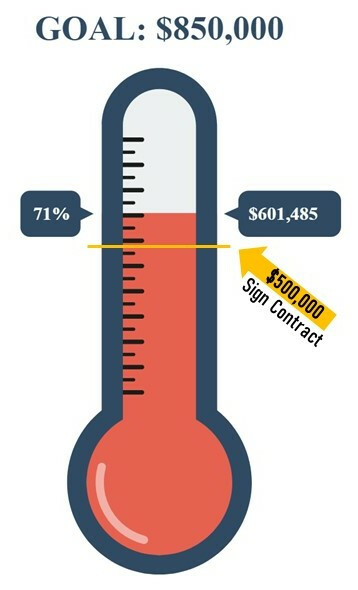
To support the project, you may fill out the Intent to Give form online or print the form and mail it.
The Organ Task Force held an Information Session Wednesday August 9 to provide an update on the organ project that will be voted on at the annual meeting. If you missed the session, a recording is available at www.roseville.lutheran.org/organ.
What are the issues with our organ?
What is the proposed solution?
Fundraising Update:The organ project is not funded by RLC’s general ministry budget. It will be funded by donations over 1-3 years. The committed donations for the pipe organ project are $530,645 as of August 15, or 62% of the project goal. Thank you to the 63 households that have donated so far! We have surpassed the $500,000 requirement to sign a contract with the recommended organ builder. To support the project, you may fill out the Intent to Give form at www.rosevillelutheran.org/organ, or print the form and mail it.
Congregational Vote – Sunday, Aug. 27 10:00 am. Vote to move forward with the organ project!
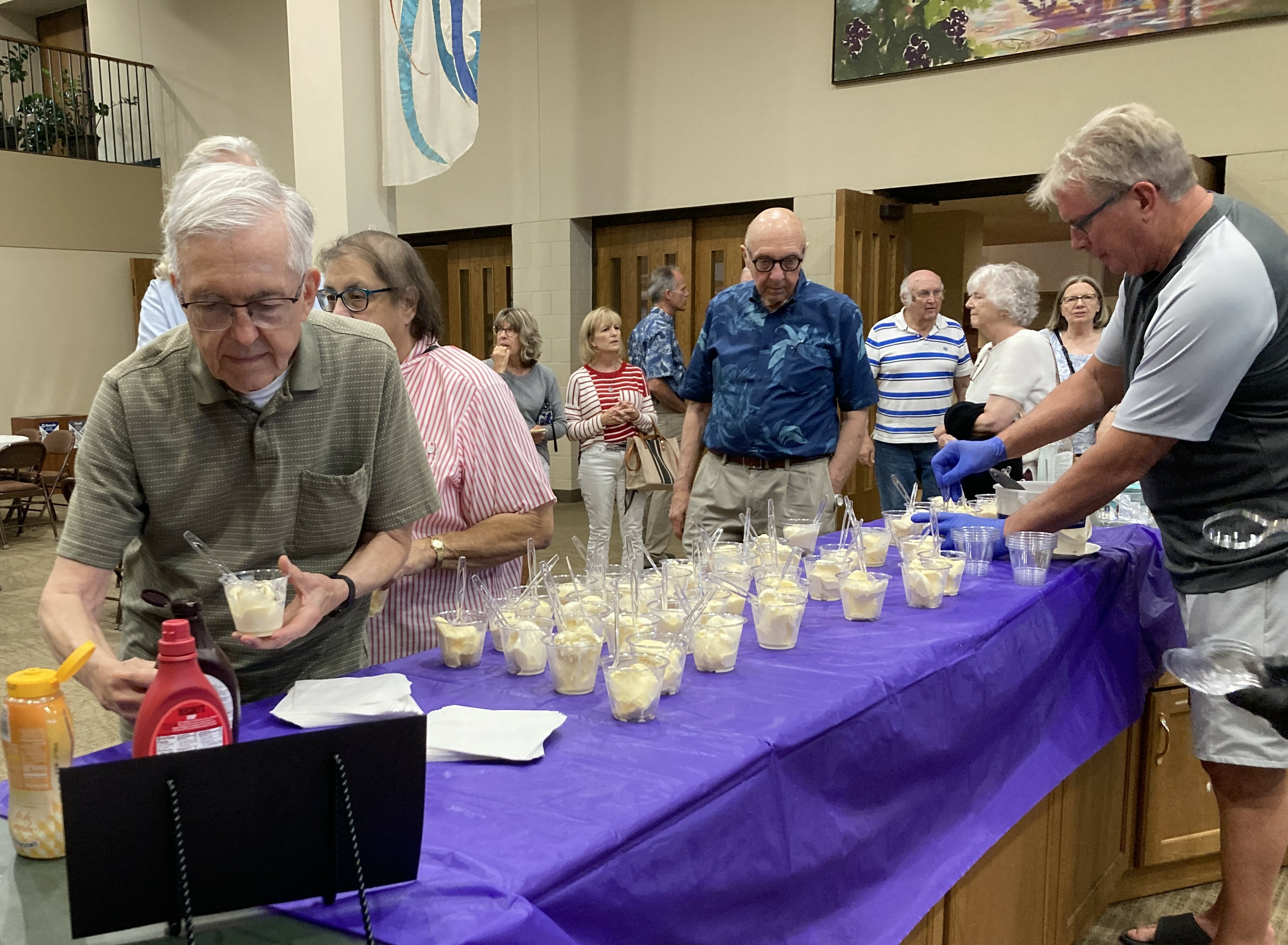 The Organ Task Force sponsored a free Community Hymn Sing featuring organ, brass and piano on Wednesday August 9. Fifteen area churches were invited along with some senior centers, and flyers were posted at several locations. There was a strong turnout of 115 very good community singers and about half of the attendees were visitors. People especially enjoyed the opportunity to request their favorite hymn and share why it was special to them. The evening wrapped up with ice cream sundaes and time to socialize in the Commons. Many people commented on how much they appreciated the evening! This is an excellent example of how the organ can be used as a community resource to bring people together to celebrate God in song and create an opportunity to meet our neighbors.
The Organ Task Force sponsored a free Community Hymn Sing featuring organ, brass and piano on Wednesday August 9. Fifteen area churches were invited along with some senior centers, and flyers were posted at several locations. There was a strong turnout of 115 very good community singers and about half of the attendees were visitors. People especially enjoyed the opportunity to request their favorite hymn and share why it was special to them. The evening wrapped up with ice cream sundaes and time to socialize in the Commons. Many people commented on how much they appreciated the evening! This is an excellent example of how the organ can be used as a community resource to bring people together to celebrate God in song and create an opportunity to meet our neighbors.
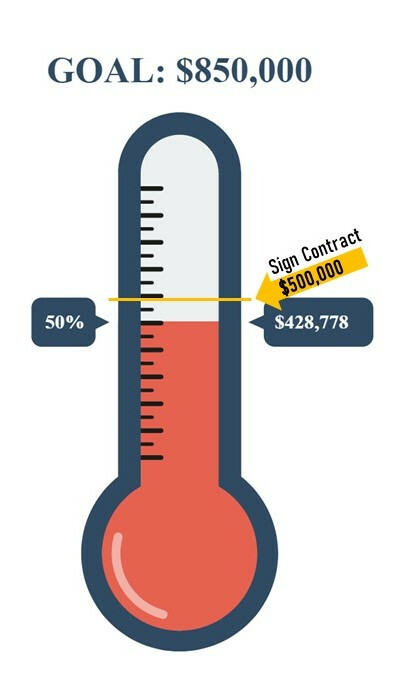
As of August 10, the committed funds for the pipe organ project are $428,778. That is over half way to the goal of $850,000 and just $71,200 away from the $500,000 requirement to sign a contract! To support the project, you may fill out the Intent to Give form or print the form and mail it.
Here is a brief summary of RLC's pipe organ project:
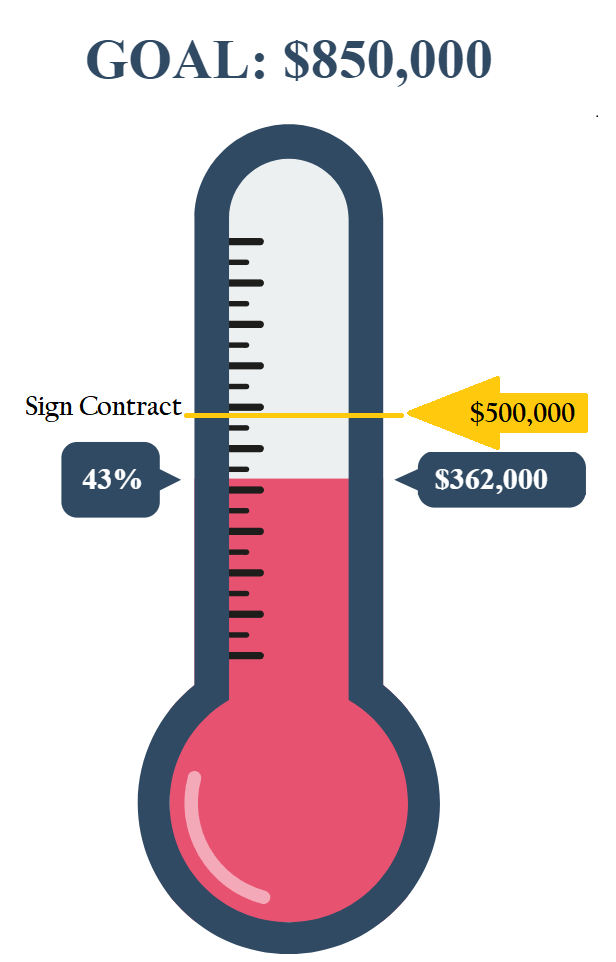
Community Hymn Sing - Wednesday August 9; 6:30 p.m. Invite your friends! Ice cream to follow.
Organ Project Information Session – Wednesday August 16; 6:30 p.m. Presentation, Q&A, refreshments to follow.
Congregational Vote – Sunday August 27; 10 a.m. Vote to move forward with the organ project!
Organ Task Force Visits the Holtkamp Organ in Birmingham, Alabama
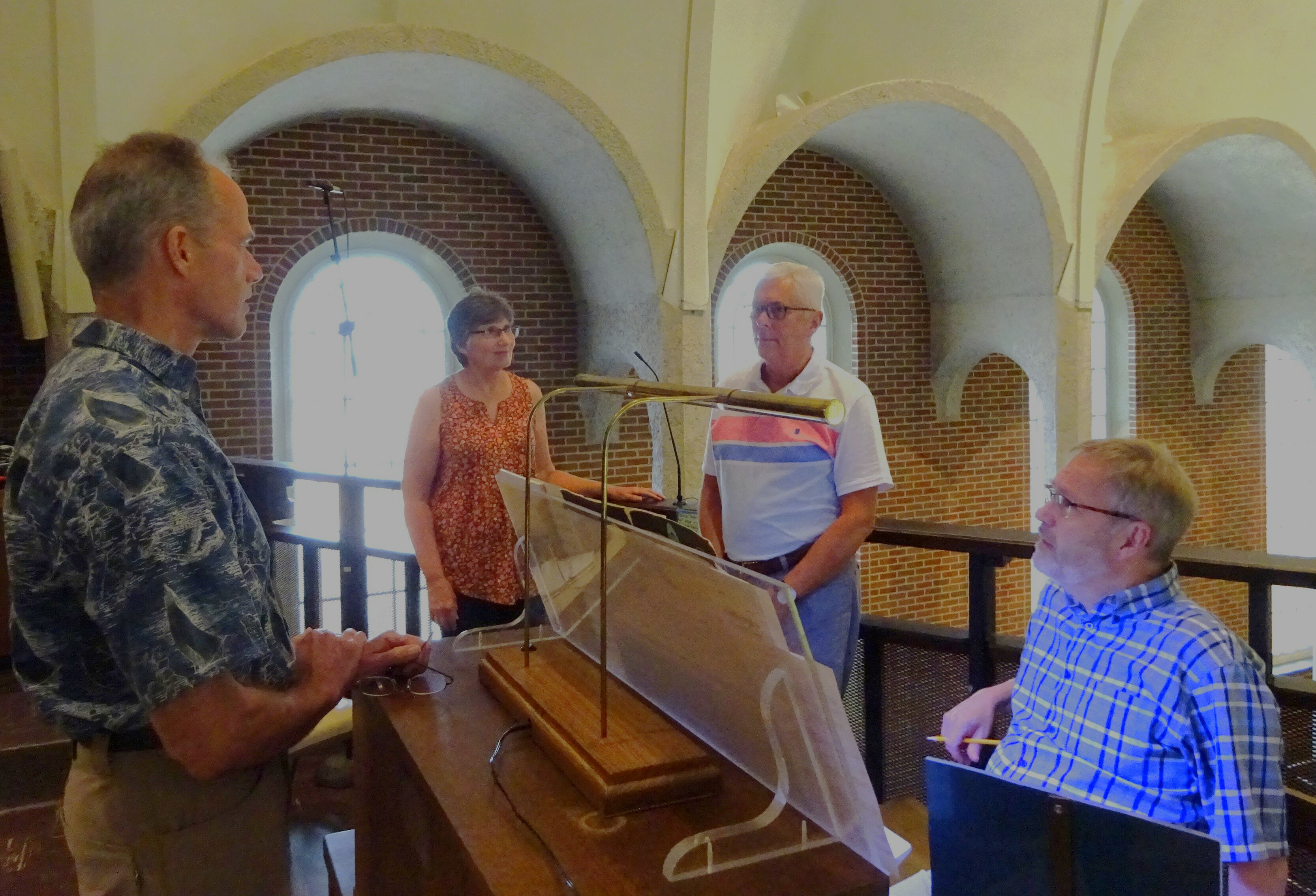
Above: Scott and Julie Henry, St. Luke’s organist Jamie McLemore, and Greg Peterson at St. Luke’s in Birmingham, Alabama
The Organ Task Force has wrapped up a year of investigating a long-term solution to address our failing pipe organ. We are now approaching the end of the bidding process to have the free Holtkamp organ at St. Luke’s Episcopal Church in Birmingham, Alabama uninstalled, restored and installed at RLC.
We have listened to the Holtkamp organ on St. Luke’s livestream, and also felt it was important to see and hear the organ first hand. KJ Bach, Julie and Scott Henry and our organ consultant, Dr. Greg Peterson, visited St. Luke’s on June 8th. Greg put the organ through its paces for about 3 hours, playing various styles of organ literature and analyzing the sound of each set of pipes. The rest of us listened and we liked what we heard! The trip left no doubt this organ is a marvelous fit for RLC and we are excited to make a presentation to the Church Council on June 21.
"The 1962 Holtkamp organ from St Luke's Episcopal church is a Win, Win, Win! The organ's basic tonal qualities will fit well in Roseville Lutheran. Reusing/renovating an existing working organ is fiscally and environmentally responsible. Getting a well-crafted organ at RLC will set a foundation and direction for expanding our music ministry." – KJ Bach
Note: Travel and consulting expenses for our organ consultant, Greg Peterson, were paid from the organ fund. Other Task Force members paid their own expenses for the Birmingham trip.
The Holtkamp organ we hope to acquire for RLC is currently in use at St. Luke’s Episcopal Church in Birmingham, AL. To hear the organ, visit https://saint-lukes.com/media to listen to their recorded services.
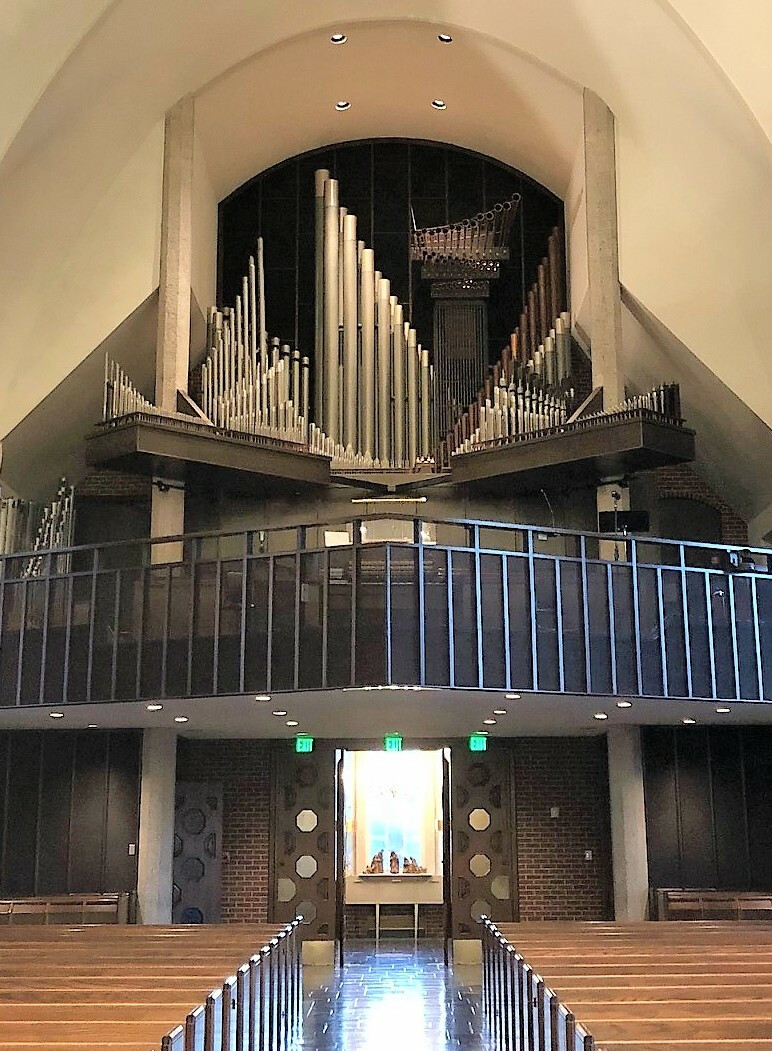
Above: The Holtkamp organ at St. Luke’s Episcopal Church.
The pipe arrangement would be redesigned for RLC’s worship center.
Organ Task Force Welcomes a New Member
The Organ Task Force is happy to welcome Dorothy Tostengard to the team! Dorothy taught school in Seattle and Roseville, gave private piano lessons, sings in the choir and is a long time member of RLC.
The Task Force is entering the next stage of the important organ replacement project. We have identified a fantastic used pipe organ for RLC and have bids from three reputable organ builders to deinstall the instrument, refurbish it and reinstall it at RLC. As the bids are analyzed, the Task Force will consider each builder’s capability, approach, tonal finishing, proposed schedule and overall cost. It is important to look at all of these elements because if the same organ were refurbished by three different organ builders, the final tonal sound of the pipe organ and its artistic design could vary greatly! Part of the Task Force’s due diligence will include listening to existing instruments by each builder and looking at each builder’s architectural and artistic style. The Task Force will make a recommendation to the Council and congregation once the evaluation of bids is complete to prepare for a required congregational vote to move forward.
Installing a high-quality used pipe organ is the best solution to address our failing organ and provides the best value to RLC. Having an excellent pipe organ is important to support RLC’s first-class music ministry, attract and retain the best musicians, organists and Directors of Music, support our community outreach, and in short…support our congregation’s future.
Organ Task Force Presentation: Used Organ Found
43 people attended the Adult Education session presented by the RLC Organ Task Force on March 5, 2023. We discussed the unique opportunity we have to acquire a used pipe organ that meets RLC’s requirements, the specifics of the organ including pictures and an audio sample, and the major milestones in a pipe organ replacement project. The Task Force outlined a potential funding model, provided an update on the organ fund, and answered questions.
If you were unable to attend, the session was recorded and is available for viewing above at the top of this web page.
The Organ Task Force is excited to report that we have found an excellent used pipe organ for RLC! The organ is currently installed at St. Luke’s Episcopal Church in Birmingham, AL and meets all of our criteria:
The Task Force will provide more information about the organ, discuss next steps and answer questions during the Adult Education session on Sunday March 5. Please join us to hear more about this fantastic opportunity for RLC to acquire a wonderful used pipe organ that could support our congregation and community for generations to come.
Approximately 27 people attended the Organ Task Force presentation during the Adult Education hour on December 11, 2022. We discussed why an organ is important to RLC’s future, the various solutions the Task Force considered, the recommendation to refurbish a high quality used pipe organ, timelines and next steps.
Some good questions were asked during the session such as:
Are used pipe organs available? Yes! There is an organ clearinghouse for used organs, while some churches, universities, or concert venues sell their organ on their own.
Why do congregations choose to sell a pipe organ? Some congregations upgrade to larger or enhanced instruments, others may consolidate or close, may not be able to afford the upkeep, or choose to move away from traditional music.
Can we sell our organ? Selling our organ is a possibility. Our Möller organ was built as a stock-variety pipe organ using a “mass production” process instead of hand-crafting each component. Its estimated street value in 2018 was $22,000.
If you were unable to attend the Adult Education session, please click here to view the slides from that presentation. Another update will be presented on March 5, 2023.
The Organ Task Force has spent the last six months studying several solutions to address our failing pipe organ. We have determined the best course of action is to replace our organ with a high quality used pipe organ that would be refurbished for our worship center. On November 17, 2022, we presented our research and conclusions to the Church Council.The Council approved our request to begin the search for a used pipe organ that meets our criteria.
The Task Force will move forward to locate an excellent used artisan pipe organ. It will be refurbished to a “like new” condition and be comparable in quality and value to a new pipe organ at a lower cost. Once an instrument is located, the Task Force will present specific details regarding costs, process and timeline to Council and recommend procurement. This project is not part of RLC’s annual budget, however early support has been generous with “intention to give” totals already about half of the anticipated cost.
Please join us for a project update on December 11, 2022 during the Adult Education hour. You can also find updates, FAQs, and a video addressing our pipe organ’s problems and why now is the time to address them on the Organ Task Force webpage at www.rosevillelutheran.org/organ.
If you’ve ever wondered how a pipe organ works, join us for 10 minutes around the organ after the 9 and 10:30 am services on Sunday October 23 to get an up close and personal look at our organ. We’ll talk about its various parts, demonstrate how it works and answer any questions you may have. This is a re-run of our 9/25 session in case you missed it. All ages are welcome!
Please join us at 10:00 am on Sunday, Dec. 11 in the Social Hall for an update on the Organ Task Force’s progress to identify a long-term solution to address our failing pipe organ.
Have you ever wondered how a pipe organ works? Join us for 10 minutes around the organ after the 9 and 10:30 am services on Sunday September 25 to get an up close and personal look at our organ. We’ll talk about its various parts, demonstrate how it works and answer any questions you may have. All ages are welcome! This demonstration will be provided again in the upcoming weeks. Watch the eBlast for dates.
The Organ Task Force continues to evaluate options to address RLC’s pipe organ. In August, our organ consultant, Greg Peterson, helped the Task Force understand how a pipe organ works, explained organ terminology, and arranged organ “listening” sessions at three local churches. The Task Force heard organs at:
The Church Council approved the Organ Task Force recommendation to hold the $30,000 designated for organ repair in the Organ Fund until a long-term solution is developed. The Task Force determined the proposed repairs would not be cost-effective as they would not restore the organ to full functionality and similar issues would reoccur in the future. Please visit the Organ Task Force webpage for further information.
RLC’s 22-rank pipe organ was installed in our previous worship center (now the Activity Center) in 1978 by the Möller Pipe Organ Company. At that time, Möller built stock-variety pipe organs using a “mass production” process. The technology built into their organs was largely unchanged from the 1920s. They are very complex and difficult instruments to keep working reliably over long periods of time. Möller remained in business until 1992 and produced over 12,000 instruments.
To reduce the cost of the 1996 Worship Center project, the decision was made to move the Möller organ instead of purchasing a new organ designed for the new space, and to look at a new organ at a later time. The organ was moved into the current worship center and no accommodations were made for the very different physics of the two spaces (room size, room shape, building materials) which affect the acoustics and overall sound in the space.
Limited repairs have been done to the organ over many years and it has deteriorated significantly. A 2018 evaluation of the condition of the organ by Grandall & Engen Organ Builders of Maple Grove, MN found it in need of significant repair. Some of the many issues include:
Our Director of Music and organist have created “work arounds” that maximize the limited capability of the current instrument, however as the deterioration continues, it is increasingly difficult and extremely frustrating to use the instrument. Problems change on a daily basis. This limits what and how music is played.
Repairs were scheduled for this summer using $30,000 from the 2022 pRAISE campaign. However, Grandall & Engen recently advised they cannot perform the repairs until the summer of 2023 due to supply chain shortages and other circumstances. This gave the Organ Task Force time to evaluate the situation. In 2021, Grandall & Engen provided a repair estimate of $30,000 to fix many issues and restore the organ to “better, but not complete, functionality” until a long-term plan could be put in place. Grandall & Engen’s 2018 proposal to fully refurbish the organ stated that even if all the faults identified at that time could be repaired, the 1920s-era Möller mechanical system used in RLC’s organ was failing and “would doom the organ to deteriorate again.” If we spend the money to repair, we will face similar repair costs in the near future. A financially-wise decision requires that we also consider the fact that while our organ has served us well for many years, it is not a high-quality instrument and the cost to repair it now exceeds its $22,000 street value.
The organ is integral to the quality and integrity of RLC’s worship and music ministry, the rich musical culture and tradition of the Lutheran Church and RLC’s community outreach ministry. The continued deterioration of the organ undermines our ability to: provide high-quality worship services and experiences, attract the most qualified music directors and organists, maintain a high-quality music ministry, and potentially grow our general membership. It is especially difficult for guest musicians to navigate the organ’s problems and that has tarnished RLC’s reputation of being a strong performance venue with ready access to a reliable instrument.
The organ was included in the previous 2019 Worship Center Renewal Project, however other line items from that project were prioritized due to the pandemic and requirements to live-stream worship while we could not worship in person. Meanwhile, the problems with the organ have become more frequent, the cost of repair is significant but will not fix everything, and the repair price tag exceeds the organ’s current value. It is time to put a long-term plan in place. (From the 1996 building committee: Move the organ now, and put in a new organ later…’later’ has now come!)
The Organ Task Force has studied the current situation, reviewed the Grandall & Engen proposals and repair bid, has met with our organ consultant, Dr. Gregory Peterson, and talked with the co-chair of another congregation’s Organ Task Force that faced nearly identical Möller organ problems.
The Task Force determined the proposed repairs were not cost-effective. They would not restore the organ to full functionality and similar issues would need to be addressed in the future. The Church Council approved the Task Force recommendation to hold the $30,000 designated for organ repair in the Organ Fund until a long-term solution is developed.
The Task Force will move forward to investigate viable long-term options, determine the pros, cons and cost of each and make a recommendation to the council in the coming months. Options that will be considered are: refurbish our existing organ, digital/electronic organs, a better quality used pipe organ, a new pipe organ.
We are fortunate to have Dr. Greg Peterson as a consultant to the Task Force. Greg was Professor of Music and College Organist at Luther College for 17 years. He retired from that position in May 2022 and is now the Music Director at Normandale Lutheran Church, Edina. Greg is an internationally acclaimed recitalist and a respected leader in the field of church music for over 30 years.
Greg will guide the Task Force through the evaluation process, providing education and arranging several “listening” sessions for the Task Force to hear a variety of organs.
Pipe organs have provided the music for choirs and congregations in Lutheran churches since Martin Luther used organ music to enhance the meaning and delivery of the Word and Sacrament.
With its wide dynamic range and spectrum of sounds, the organ is reflective of the many ways God speaks to us. Its majesty can remind us of God’s thunder, and its quietness of His still, calm voice. No single instrument is better equipped to support the singing of the congregation. The depth and presence of the organ provides a foundation that people can not only hear, but “feel” – and that encourages them to sing!
The tonal resources of the organ make it effective in accompanying traditional hymns, as well as supporting the singing of contemporary worship music. The organ is capable of blending well with almost any combination of electronic or acoustical instruments and has the ability to fill in the tonal “gaps”. In addition to their traditional sounds, organs of the 21st century are capable of MIDI interface to make full use of sounds in modern music.
The organ pays homage to the Lutheran tradition of worship, hymns that paraphrase scripture and singing. It enhances and transforms our worship experience and music program. The organ creates the collective song that nurtures and transforms us once the liturgy has ended and our service outside RLC’s doors begins.
Click on the links below for more information on the technical aspects of a pipe organ:
https://www.youtube.com/watch?v=uRqR9-akXEo
https://www.pipedreams.org/page/how-a-pipe-organ-works
The Task Force will provide updates in the Table, the RLC eBlast and on this webpage. There will also be various educational opportunities for people to see, hear and better understand the challenges of our organ. Watch for times and dates of these opportunities in the eBlast.
Click here to email the Organ Task Force or contact any of the members of the Task Force: KJ Bach, John Helgen, Julie and Scott Henry, Martha Mutch, Craig and Heidi Sneltjes.
Digital instruments replicate the sound of a pipe organ, but digital sound is not the same as a pipe’s sound. Digital instruments work by sampling/recording the sound of pipe organs. The samplings are then looped, randomized and electronically amplified through speakers. A pipe organ, however, acts as its own amplification system. Even if you can’t immediately distinguish between the sound of an authentic pipe or a digital sample, over a period of time the presence of organically produced sound is generally more pleasing to our senses.
The tonal advantage of sound from a collection of pipes compared to sound from a collection of loudspeakers is based on scientific principles. Just as listening to a CD recording of a symphonic performance is not the same as attending the live performance, there is no substitute for an authentic pipe organ.
Our current pipe organ could be refurbished. We received bids for two options in 2018 at costs of $375,000 and $625,000. Both options retained our existing pipes, added additional refurbished pipes and re-built the console. The major drawback to this option is that most of our existing pipes are not high-quality pipes - they were mass-produced rather than hand-crafted. Making a large investment around those pipes would not result in a quality instrument. We can acquire a better quality used instrument and refurbish it (and possibly incorporate some of our nicer pipes) for nearly the same price and end up with a much better pipe organ.
Yes, there are exciting possibilities available! Churches and other institutions sell their pipe organs for a number of reasons; they may be upgrading to a different instrument, consolidating, closing, etc. There are a number of pipe organs available both locally and across the U.S. that range from $0 to $200,000 or more depending on the size and condition of the instrument.
Some of the primary characteristics would be:
The goal is to end up with a much more dynamic, versatile pipe organ that is exciting to play, inspiring to listen to and complements our worship center musically, liturgically, artistically, and architecturally.
For a refurbished used pipe organ, it would take approximately 18 to 24 months from when an organ is purchased/taken over/moved to final completion. The timeline would most likely be longer to commission a new organ since all the components would be newly built. In either case, the timeline would depend on the builder’s schedule, supply chain issues and the fact that things tend to move more slowly these days.
Pipe organs have been used as the accompanying instrument in the Church since as early as the 10th century because they are the only instruments able to offer the natural volume to fill large spaces and the diversity of sounds necessary to support the wealth of sacred music.
The pipe organ is a wind instrument and has breath like the human voice, making it a natural choice for accompanying and encouraging singing. Pipes actually move air and that allows you to hear and feel the sound of a pipe organ. That is what best supports congregational singing.
Artisan pipe organs also have excellent value when cost is amortized over their life spans.
A well-built, well-maintained pipe organ can last for centuries. The instrument that our organist, Martha Mutch, studied on in Hamburg, Germany is over 400 years old and was played by J.S. Bach. It was dismantled pipe-by-pipe and stored for protection during WWII, then re-assembled after the war.
Ongoing costs would include insurance, maintenance, and biannual tuning. For an organ sized for RLC’s worship center, tuning would cost approximately $2000 per year. Pipe organs also need to be “re-leathered” every 50-60 years at a cost of about $50,000. It is important to note that the pipe organ has excellent value when cost is amortized over its life span of 100 years or more, compared to a digital instrument which would need to be completely replaced multiple times during that period.
Yes! Some examples of significant local Lutheran congregations that have invested in their pipe organs include:
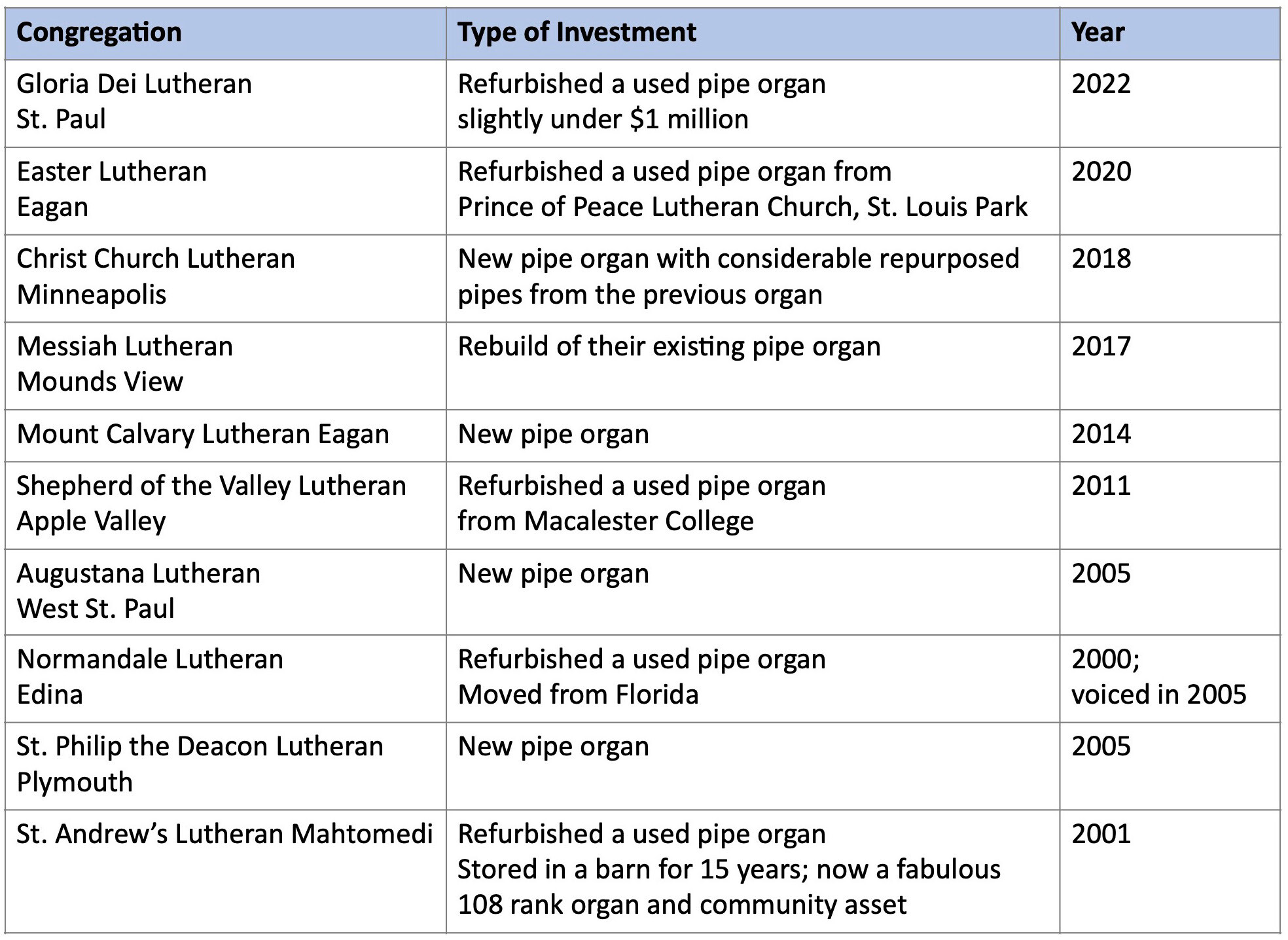
The purchase of a new pipe organ might seem like an indulgence in a luxury item, but it is actually an investment in the proclamation of God’s Word in song for future generations. There is nothing more central to the life and health of the church as worship and music plays a vital role in our worship experience. Hymns are Bible verses set to music that find a lifelong place in our memories. When we sing these words together in worship, we feel connected to God and to each other.
God has provided us with faithful pastors, leaders, and musicians and it is important to support them by providing the proper tools needed to do their work. An upgraded pipe organ will demonstrate our mission to love God and love our neighbor. It will serve in our regular worship life and enhance our worship center as a place for music performance – concerts, recitals, hymn festivals – reaching out to a wider and more diverse community with a message of grace, hope and joy in Christ.
The project to upgrade our organ is not part of RLC’s annual budget and will need to be funded by donation. A gift designated for the organ project should be considered above and beyond the primary obligation to support RLC’s annual ministry budget.
___________________________________________________
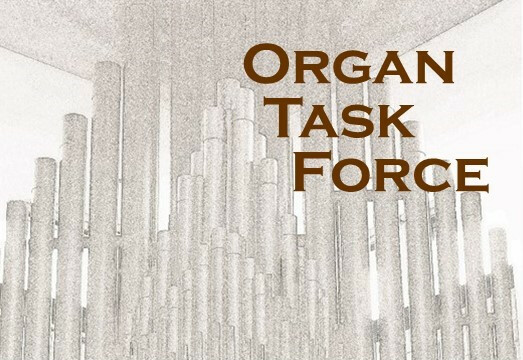
Music ministry has been an important part of Roseville Lutheran’s history. Vocal choirs, bell choirs, praise and worship bands, RLC Brass, and RLC Jazz bring musicians and listeners of all ages together to sing, play and worship. At the heart of RLC’s music is the pipe organ. In the Lutheran Church, the pipe organ has provided the musical structure for worship for 500 years. It is an essential and integral part of worship, enriching the experience with liturgy and hymns. The organ inspires congregational singing, guides our choirs and accompanies our other musical ensembles. It is used for:
RLC’s 22-rank organ was designed for the 1969 Worship Center (now the Activity Center) and installed in 1978 by the Möller Pipe Organ Company, which built pipe organs in a ‘mass production’ type process during the 1970s and 1980s. With the transition to the current 1996 Worship Center, the organ was simply moved into the new space. No enhancements or upgrades were made to re-size or voice the organ for the space, which is significantly larger and very different in shape and building materials.
Limited repairs have been done to the organ over many years and it has deteriorated significantly. A 2018 evaluation of the condition of the organ by Grandall & Engen Organ Builders (Maple Grove, MN) found it severely undersized for the space and in need of significant repair. Some of the issues include:
Grandall & Engen provided two proposals with initial rough estimates to refurbish the organ and address the issues at that time. Both proposals included replacing the leaking windchests, replacing the console system, adding additional pipes and rescaling and revoicing all pipes.
No action was taken on either proposal. In 2021, Grandall & Engen provided a repair estimate of $30,000 to fix many issues and restore the organ to better, but not complete, functionality until a long-term plan could be put in place. Repairs were scheduled for this summer using $30,000 from the 2022 pRAISE campaign; however Grandall & Engen recently advised they cannot do the repairs until the summer of 2023 due to supply chain shortages and other circumstances. It is important to note that Grandall & Engen’s 2018 proposal stated that even if all the faults identified at that time could be repaired, the 1920s-era Möller mechanical system used in RLC’s organ was failing and “would doom the organ to deteriorate again.” Their 2018 proposal estimated the street value of RLC’s organ, if sold as is, at $22,000 or less.
To most, the organ sounds just fine because our Director of Music Ministry and our organist have become very skillful in knowing which parts of the instrument cannot be used and what to do when it acts up. However, even with this experience it is impossible to know what stops/pipes work on a given day as problems become more frequent. Sometimes the issues are obvious to all, such as when a pipe starts or continues to sound and disrupts the service. It is especially difficult for guest musicians to navigate the problems and that has tarnished RLC’s reputation of being a strong performance venue with ready access to a reliable instrument.
The organ is integral to supporting the quality and integrity of RLC’s worship and music ministry. A good instrument enhances worship, attracts the most qualified music directors, organists, guest musicians and clinicians. It can be a built‐in recruitment asset because a church with an excellent music program attracts members. In summary, RLC’s organ continues to deteriorate, is not designed or optimized for the current space and the repair price tag is substantial compared to the organ’s current value.
The purpose of the task force is to investigate viable options and costs, determine the pros and cons of each and make a recommendation to the council. The task force will leverage the work already done by the 2019 Worship Center Renewal Project working group and look at the following options:
The recommendation on whether to repair or not repair the organ should be made relatively quickly so we can advise Grandall & Engen on how we want to proceed.
The RLC Organ Taskforce will serve in an advisory capacity to the Church Council and work collaboratively with staff, volunteers and committees/teams. The task force will:
The task force asks that the Church Council respond in a timely fashion to task force recommendations and be flexible to respond quickly, and possibly outside of a regularly scheduled meeting. For example, if the Church Council approved looking for a used instrument, we may have to move quickly if the right instrument becomes available.
The recommendation would dictate next steps for the task force. If the recommendation includes replacing the current instrument, the task force would move forward to:
1) Recommend a replacement instrument option (new or used) with consideration for:
a) musical tone and style
b) size and allotted physical space
c) visual effect in the church
d) the organ's life span
e) creative ways to leverage the best of what we have (i.e. re-use the console shell, some pipes, etc.)
f) cost
2) Identify the best vendor/installer for the project
3) Develop marketing materials for congregational communication and education
4) Deliver congregational education
5) Establish a list of possible donors to jump start a formal fundraising campaign
The Taskforce will consist of the following members: